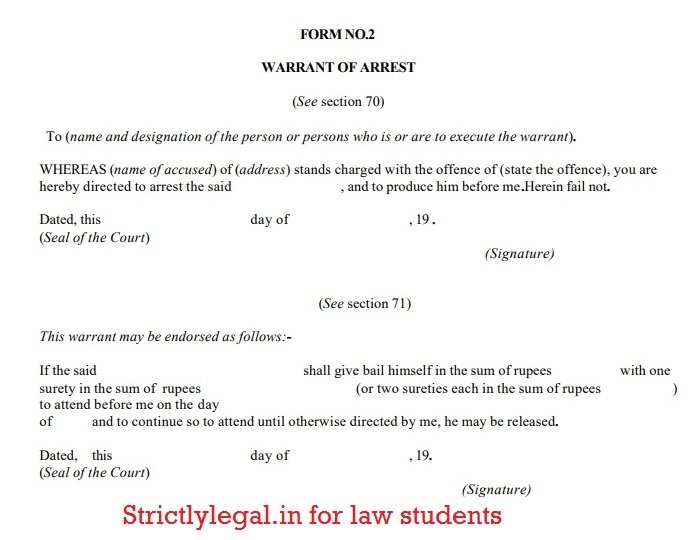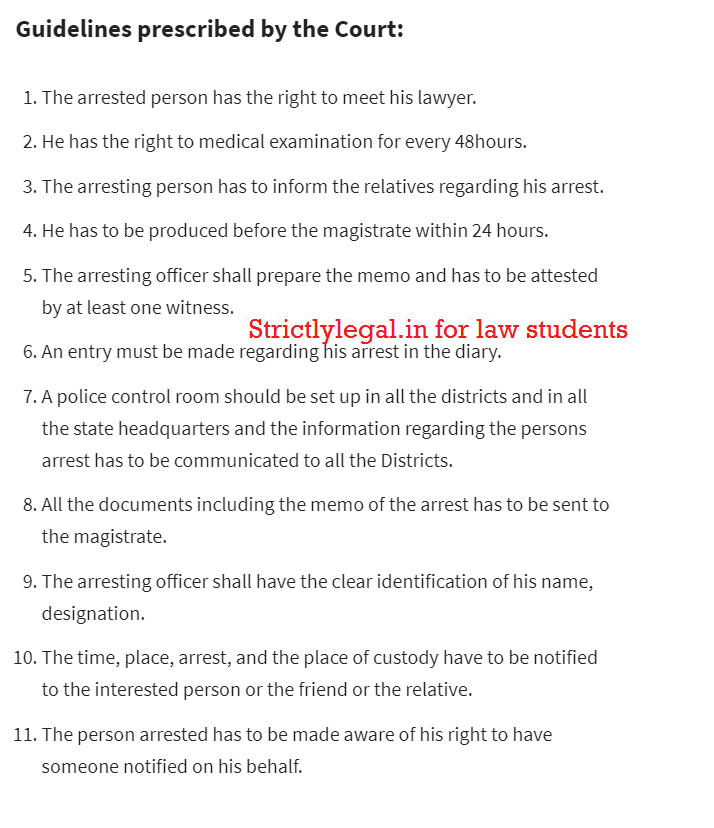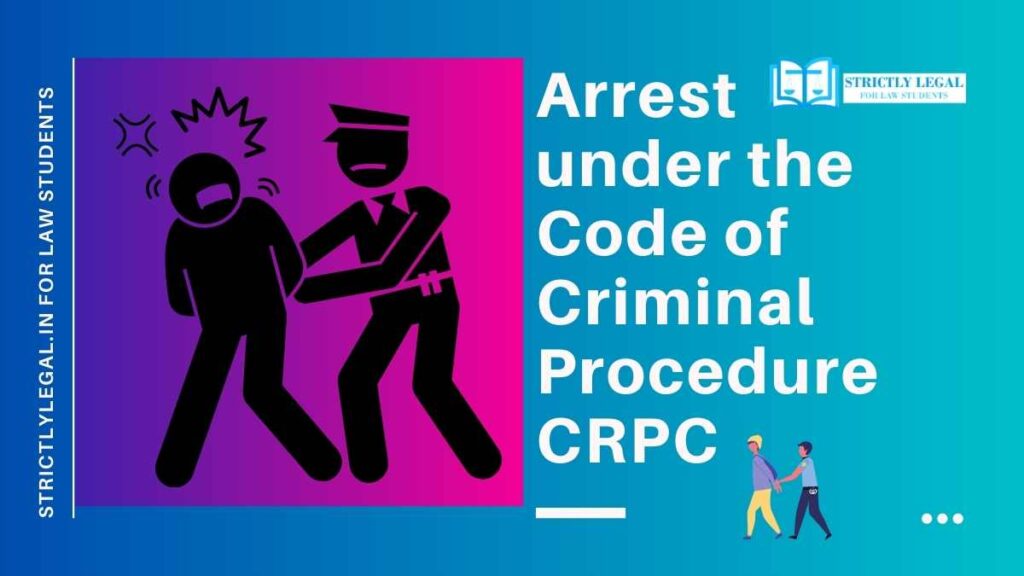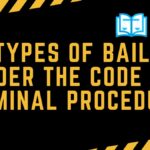In this blog, we will deal with arrest and its procedure under crpc (Code of Criminal procedure, 1973) and answer popular questions that are asked in LLB and other legal exams relating to arrest and rights of arrested person under crpc. The answers have been supported by Bare Acts and Case laws as far as applicable.
Table of Contents
Meaning and Definition of Arrest:
How do we define arrest under crpc? The word ‘Arrest’ has not been defined under the CRPC or the IPC. However, it may be referred to as the apprehension of a person by legal authority resulting in deprivation of his liberty. An arrest is probably the most effective means of securing the attendance of a person at his trial though for reasons such as deprivation of liberty it is not always the best option.
Types of Arrests
The Code of criminal procedure contemplates two types of arrests(1) Arrests in pursuance of a warrant and (2) Arrests without any such warrant.
A warrant of arrest is a written order by a magistrate directing a person named therein to be apprehended by the police or some other person specifically and commanding such person to make an arrest of the accused person.
The decision to issue a warrant of arrest or not to issue lies with the magistrate, however, such powers must be used keeping in mind the balancing social interests. If any person accused of an offense appears less likely to present himself before the court for trial in the opinion of the magistrate then the social interest would demand he be arrested and detained and rightful trial be held as per the norms of Natural Justice.
1. Arrest in pursuance of a warrant
In pursuance of section 70 CRPC every such warrant of arrests issued by a court under the code of criminal procedure will have to be signed and be in writing by the presiding officer of such court and shall bear the seal of the court. The warrant of arrest is valid until it is executed or it is repealed by the same court that has issued it.
The form for warrant of arrest has been prescribed in second schedule as FORM 2.

A warrant of arrest in ordinary circumstances be directed to one or more police officers but if the court issuing such warrant is satisfied that no police officers are immediately available then the court may direct any person or persons to execute the same as per the provisions of CRPC under Section 72.
Mode of execution of such warrant
A warrant of arrest can be executed anywhere in India as stated in Section 71 CRPC however, execution of a warrant outside the local jurisdiction of the court by which it was issued needs special procedure to be followed as prescribed under section 78 to 81 CRPC.
Section 78 CRPC states that when a warrant has to be executed outside the local jurisdiction of the court which issues it, the court instead of directing a police officer within its jurisdiction to execute such warrant may forward such warrant along with sufficient documents to the magistrate or the District Superintendent of police or the commissioner of police under whose jurisdiction the warrant needs to be executed. And such a person may after endorsing his/her name if practicable execute the warrant in the manner provided.
Section 79 CRPC states that when a warrant is directed to be executed outside the local jurisdiction of the court which has issued the warrant then the police officer shall ordinarily take it for endorsement to the Executive Magistrate or a police officer, not below the rank of an officer in charge of whose jurisdiction the warrant is to be executed. Such an endorsement shall be sufficient authority to the police officer who is to execute such a warrant outside his jurisdiction. However, sub-section 3 states that the need for such an endorsement may be skipped if the execution cannot be delayed.
Section 80 CRPC states that when the warrant is executed outside the local jurisdiction of the court issuing it, the person arrested should be taken to the Magistrate or District Superintendent or commissioner under whose jurisdiction the person has been arrested unless he has been arrested within 30kms of the court that issued the warrant or the Executive Magistrate or the District Superintendent or the commissioner of whose jurisdiction the warrant was issued is nearer.
Section 81 CRPC states that the Executive Magistrate or the District Superintendent or the commissioner shall transfer the custody of such arrested person if they are of the opinion that the person arrested is the same as has been requested by the court who issued the warrant.
Provided that if the offense is bailable and such person is ready and willing to give bail to the satisfaction of such magistrate that issued the warrant, the Executive Magistrate or the District Superintendent or the commissioner may take such bail or bond as security as the case may be and forward it the court that had issued the warrant. And if the offense is non-bailable then the chief Judicial Magistrate or the sessions judge of the district subject to section 437 CRPC may take into consideration the documents and information as had been forwarded under section 78 and release such person on bail.
2. Arrest without a warrant
Can a police officer Arrest without a warrant?
Section 41 CRPC enlists certain conditions that must be satisfied for a police officer to make an arrest without a warrant.
Any police officer may without an order from the Magistrate and without a warrant arrest any person-
- that commits in the presence of a police officer a cognizable offence.
- against whom a reasonable complaint has been made or credible information has been received or a reasonable suspicion exists that he may have committed a cognizable offense punishable with imprisonment which is less than or equal to 7 years of imprisonment with or without fine and the following conditions are satisfied-
1. The Police officer has reasons to believe that such person has committed the offense.
2. There are reasons to believe that such a person will not present himself at the court when required or he may commit further offense or may cause evidence to disappear or prevent proper investigation or may cause a threat to any witnesses or is necessary to take into custody for proper investigation.
or against whom a complaint has been received or credible information has been received and a reasonable suspicion exists that such person has committed a cognizable offense punishable with imprisonment more than 7 years with or without fine and on the basis of that information the police is of the opinion that such person has committed the said offense. - that is a proclaimed offender under the CRPC or by an order of the state government.
- In whose possession some stolen property is found and there exists a reason to believe that such person has committed an offense in relation to that stolen property
- that obstructs the police officer while in the execution of his duty or who has escaped or attempted to escape from lawful custody.
- Is reasonably suspected of being a deserter from the armed forces of the union
- that is concerned with an act committed outside India that is an offense in India and against whom a reasonable complaint has been received or some credible information has been obtained or a reasonable suspicion exists and for the same, he is liable for extradition or apprehension under any law in force in India.
- Is a released convict and has breached some rule related to his release.
- arrested under a requisition made by a police officer to arrest such a person who may be arrested without a warrant.
Can the police officer arrest a person in a non-cognizable offense without a warrant?
A police officer may also make an arrest if any person in the presence of the police officer has committed a non-cognizable offense and he refuses to furnish true information relating to his name and residence or furnishes fake information in the opinion of the police officer. In such a situation Section 42 gives power to the police officer to take in the custody of such person and the person can be released on bond when his true name and residence have been ascertained. If within 24 hours his name and residence cannot be ascertained or he cannot execute a bond he shall be presented before the nearest magistrate having jurisdiction.
In all other circumstances, no person concerned in a non-cognizable offense against whom a complaint has been received or a reasonable suspicion exists of having committed such offense shall be arrested except without an order from the magistrate or without a warrant.
Guidelines for Arrests and Detention
The Supreme Court of India has laid down detailed guidelines to be followed by a police officer while arresting a person and these rules have been laid down in the case of D. K Base Vs. the State of West Bengal in the judgment dated 18/12/1996. Later on, the code was amended and section 41-B laid down the procedure that must be mandatorily followed for making an arrest.

Can arrest be made by a private person?
Section 43 of the CRPC states provisions giving powers to private persons to make arrest in particular circumstances. Any private person may arrest or cause to be arrested any person –
- who in his presence commits a non-bailable and cognizable offense. The importance of AND must be noted here.
- Or is a proclaimed offender
- He shall without any further delay be taken to the nearest police station.
If the Police is of the opinion that section 41 CRPC applies, that he shall be re-arrested. Or if the officer is of the opinion that the person so arrested has committed a non-cognizable offense and on demand by the officer he refuses to disclose his true name and residence or gives false name and residence he shall be dealt under the provisions of Section 42 and in all other circumstances if there’s no reason to believe he has committed any crime he shall at once be set free.
Can a magistrate make an arrest?
Under the provision of section 44 (1) CRPC any magistrate i.e whether Judicial or executive has the power to make an arrest if in the presence of the magistrate any person commits an offense and he can make such arrest himself or through another person and thereafter subject to the provisions of the code bail or commit the offender to custody.
In 44(2) CRPC the magistrate has been given powers to make arrest or order arrest to be made by some other person within his local jurisdiction for whose arrest he is competent at the time and in the circumstance to issue a warrant.
There’s a very thin difference between sub-section 1 and 2. In arrest made under subsection 1 of section 44 CRPC the magistrate can commit the offender to custody while in subsection 2 the magistrate does not have the power to commit the offender to custody.

Passionate about using the law to make a difference in people’s lives. An Advocate by profession.





